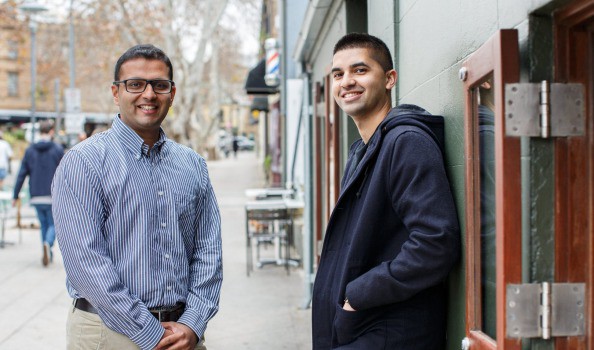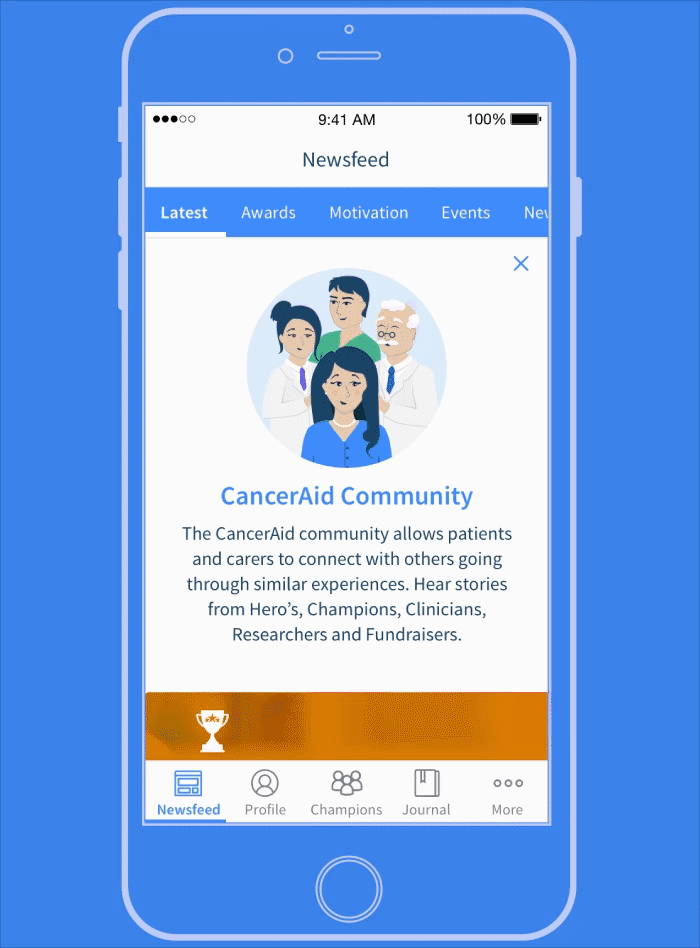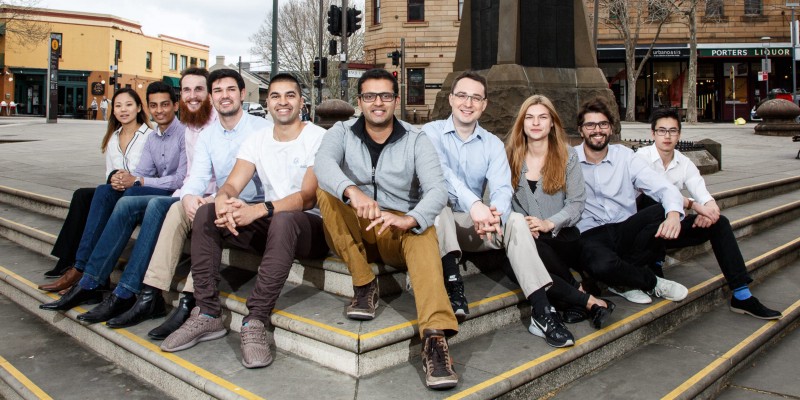Cancer can be an isolating and overwhelming experience for all involved. CancerAid aims to improve the cancer experience by building a patient-centred app that provides patients access to peer-reviewed information as well as a place to record and share their own personal journal. We spoke to the Co-Founder of CancerAid, Dr. Raghav Murali-Ganesh, about his experiences developing the app and how he is using his success to support the Australian health ecosystem.

What is your health innovation? What does it aim to do?
Health is an industry that is traditionally conservative and provider-centric, but patients’ expectations and wants from their health are ever-changing. CancerAid is an app that helps cancer patients by delivering a patient-centered focus on health.
Developed by two oncologists including myself and Dr. Nikhil Pooviah, the genesis of CancerAid was based on our experiences in clinical practice. We witnessed antiquated methods of communication between doctors and patients and we believe our technology can bridge this communication gap.
We started by surveying patients at Chris O’Brien Life House in Sydney. There are four problems most of our patients faced on a day-to-day basis which can be extrapolated to most cancer patients:
- After initial diagnosis patients are information hungry. They are constantly searching for the right information from the right sources, but often it is not relevant or personalized to them. To overcome this problem, we have included peer-reviewed treatment information that can be stored in a user’s
- Anecdotally from our own experiences, which is also backed by medical literature, patients who kept a log of treatment and symptoms lived up to 5 months longer than those who did not. We have therefore integrated a personal journal and a symptom journal into CancerAid to allow patients to log their personal experience and record and track their symptoms over time.
- Patients wanted to tell their friends and family about their disease, but they didn’t want to call everyone in their network. The feature Champions allows patients to connect their health profile with family and friends so that they can follow their journey and provide advice and support.
- Historically medicine has been a linear relationship between doctors, nurses, and patients. Instead of being told how they should or shouldn’t feel by doctors and nurses, patients want to hear from other patients who have gone through similar experiences. The CancerAid community allows community members to directly interact with one another, to share experiences, and reduce the isolation they feel.

How do you celebrate and showcase your successes? Who is the first person you tell?
We have fostered a company culture that celebrates all successes. As a startup, we face a lot of challenges, so it is important as a team to sit back and acknowledge the wins and losses. We even have a small bell that we ring when something goes well! We have grown from a team of 2 to 15 in the past two years which was a big change leading to more opportunities and challenges.

What challenges have you come up against in developing your health innovation? What motivated you to keep going?
A spectrum of challenges exists in health innovation. For start-ups, the initial challenge and hurdle is product-market fit. In health, it is hard to find a sustainable business model, one that works to keeping the idea alive rather than trying to secure one-off grant funding. Creating a sustainable and scale-able business from a health innovation is very challenging.
At CancerAid every component we add to the app is adding clinical value to the patient, while leaving the features free for users. The challenge is then building commercial value based on the clinical value we have created. We are working towards finding a balance between the two.
Marketing of CancerAid is also a challenge. It is difficult to give the product the credit it deserves, as each use case is unique and personal. Translating complex medical information into a consumable format is another difficult task.
What is one thing the public could do to help your innovation to succeed?
Receiving feedback about our product is very valuable to us. When we speak to users who have had positive experiences using the app we want to communicate this to other potential users. We would encourage those who are using CancerAid and finding it beneficial to contact us directly. Individual experiences are the most powerful and allows us to provide support to a bigger audience.
We would also like users to connect us to people who are interested and can potentially gain value from CancerAid. We want to improve the lives of as many patients as possible.
What are the benefits of developing your innovation in Australia?
Australia has an emerging startup ecosystem and we are very lucky to be a part of such a supportive community. In terms of a health ecosystem, we have great health system and an abundance of keen clinicians and researchers and no lack of leaders to mentor the next generation. In fact, we are lucky to have mentored 20 health tech startups over the past year and a half, and we look forward to giving back to this supportive community.
Practically, we have taken advantage of both the R&D tax rebate and Export Market Development Grants from the Australian government. We would like to see the implementation of a better structured funding scheme within the health tech space that could develop a cohesive development scaffold for health tech in Australia.
CancerAid was born a little over two years ago and the team have ambitious plans for 2018, keep up to date with their progress by following CancerAid on Health Horizon.
What challenges have you come up against in developing your health innovation? What motivated you to keep going?
A spectrum of challenges exists in health innovation. For start-ups, the initial challenge and hurdle is product-market fit. In health, it is hard to find a sustainable business model, one that works to keeping the idea alive rather than trying to secure one-off grant funding. Creating a sustainable and scale-able business from a health innovation is very challenging.
At CancerAid every component we add to the app is adding clinical value to the patient, while leaving the features free for users. The challenge is then building commercial value based on the clinical value we have created. We are working towards finding a balance between the two.
Marketing of CancerAid is also a challenge. It is difficult to give the product the credit it deserves, as each use case is unique and personal. Translating complex medical information into a consumable format is another difficult task.
What is one thing the public could do to help your innovation to succeed?
Receiving feedback about our product is very valuable to us. When we speak to users who have had positive experiences using the app we want to communicate this to other potential users. We would encourage those who are using CancerAid and finding it beneficial to contact us directly. Individual experiences are the most powerful and allows us to provide support to a bigger audience.
We would also like users to connect us to people who are interested and can potentially gain value from CancerAid. We want to improve the lives of as many patients as possible.
What are the benefits of developing your innovation in Australia?
Australia has an emerging startup ecosystem and we are very lucky to be a part of such a supportive community. In terms of a health ecosystem, we have great health system and an abundance of keen clinicians and researchers and no lack of leaders to mentor the next generation. In fact, we are lucky to have mentored 20 health tech startups over the past year and a half, and we look forward to giving back to this supportive community.
Practically, we have taken advantage of both the R&D tax rebate and Export Market Development Grants from the Australian government. We would like to see the implementation of a better structured funding scheme within the health tech space that could develop a cohesive development scaffold for health tech in Australia.
CancerAid was born a little over two years ago and the team have ambitious plans for 2018, keep up to date with their progress by following CancerAid on Health Horizon.
